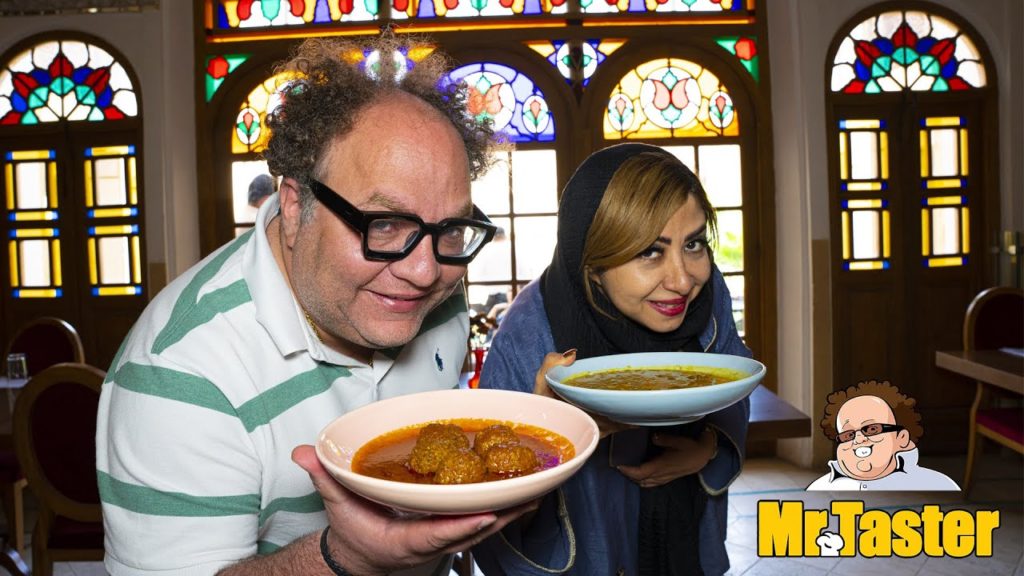► More Street Food in Iran:
►Go Follow My Instagram:
►Music:
Tasting Gooshto Loobia (Meat and beans) and Shefteh Sumac, traditional and local food of Kashan in the historical Saraye Ameriha boutique hotel and visiting the rose water extraction process in the huge factory of Rabee rose water on the last day of our trip to Kashan. In the city of Kashan, we chose the historical Saraye Ameriha boutique hotel to stay in, which was built during the Zandieh period and developed during the Qajar period, that is, more than 230 years old. The area of this house is 7,000 square meters with 85 rooms.
This house also has several different courtyards, we tried two very famous dishes of Kashan here, one was the traditional Gooshto Loobia (meat and bean) stew of Kashan, which is delicious with fresh mutton, white beans, onions, cinnamon, saffron, salt, black pepper and turmeric and it is usually eaten as a stew with Shivid Polo (dill rice) Kashan’s famous sumac shefteh or sumac meatball shefteh, which is also called chickpea shefteh, is one of the most delicious and famous dishes of Kashan, which is a combination of minced mutton that is mixed with chickpea flour rolled in meat balls with sumac sauce and dry mint and I can say that in fact the most important flavor of this food is the sumac and it tastes sour, which makes the food extremely delicious
The last day we went to Mohammadi rose Flower Fields Of Raheb collection, here is the mine of Mohammadi rose flowers in the world, and something about one hundred and twenty hectares of farm that eighty hectares have been planted with Mohammadi rose flowers. Harvesting and rose picking season is from early May to late June. After harvesting, the flowers go to Iran Gulab factory, which is the famous brand of Rabee rose water, which is well known in the world. Regarding the high quality of the Mohammadi rose flowers, I must say that roses usually have 22 to 30% essential oil, but the flowers of Raheb farm have up to 38% essential oil, which shows how much they work on these organic flowers and their quality.
After the Mohammadi rose flowers are harvested from the beautiful Raheb farms, they go to the largest rose water factory in the world, the Iran Gulab Factory. The method of industrial rose watering is that a ton of rose is poured into very large pots and distilled with a ton of distilled water. It takes about three and a half to four hours to cook and the steam comes into special tanks with cold water around them and then turns into rose water and goes into smaller tanks.
There is a part on the tanks where Mohammadi rose fragrance is separated because it is lighter it’s on the top, it enters the containers. The fragrance costs about 8,000 to 10,000 $ per kilogram and are sold to perfume and cologne factories in different parts of the world such as France, Spain and Germany. In the next step, the rose water is poured into tanks and from there they are filled into different jars and bottles with a filling machine.
About 18,000 bottles per hour, are filled with first class rose water here. Regarding the preparation of Do Atisheh rose water, I must explain that when the first stage of rose extraction is done, in the next stage, instead of distilled water they add fresh flowers in a new pot and add the previous rose water to it and the second distillation is done in this way you have Do Atisheh rose water. Also, during this visit, we had the opportunity to talk with Mr. Raheb, the owner of Rabee rose water brand, who told us about their love and interest in this industry and the efforts they have made over the years to preserve the environment and respect nature. There’s no question why he is titled the king of mohammadi rose flowers and rose water.
►Video By:
Amir Ali Nasiri rad:
Aref Sayad:


AloJapan.com